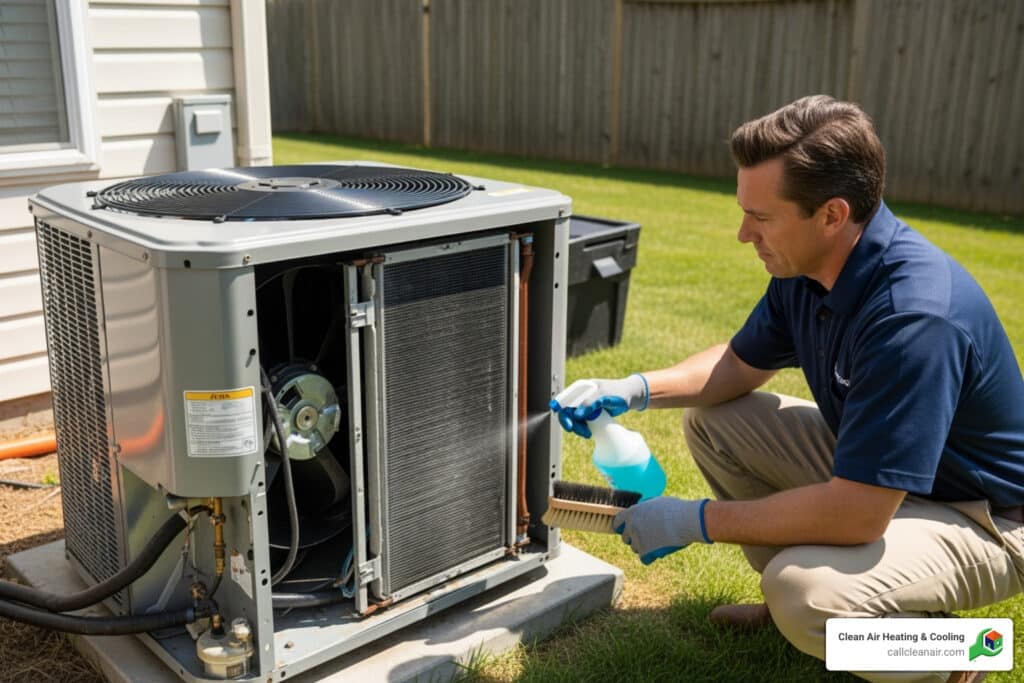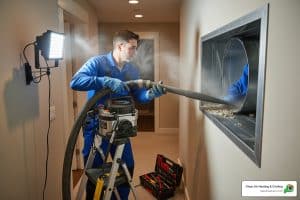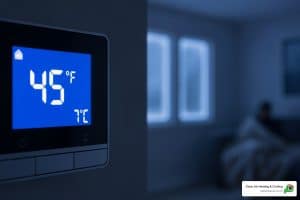Why Regular AC Maintenance Tips Keep Your Home Comfortable
AC maintenance tips are essential for keeping your cooling system running efficiently and lasting years longer than neglected units. Like regular oil changes for your car, consistent air conditioner care prevents major breakdowns and saves you money over time.
Quick AC Maintenance Checklist:
- Change filters monthly during cooling season
- Clean outdoor unit and clear 2-foot area around it
- Clear condensate drain line to prevent water damage
- Schedule professional tune-up every spring
- Check thermostat settings and seal air leaks
Regular maintenance delivers three major benefits for homeowners in Northwest Washington. First, it reduces energy bills – a dirty filter alone can increase energy consumption by up to 15%. Second, it extends your unit’s lifespan by about 40% through regular seasonal inspections. Third, it prevents costly emergency repairs by catching small problems before they become expensive failures.
The best part? Many maintenance tasks are simple DIY jobs that take just minutes to complete. However, knowing when to call a professional is equally important for safety and optimal performance.
As Colin Matei, owner of Clean Air Heating & Cooling, I’ve seen how proper AC maintenance tips can transform a struggling system into an efficient, reliable unit that keeps families comfortable for years. My experience serving Bellingham and surrounding communities has taught me that preventative care is always more affordable than emergency repairs.
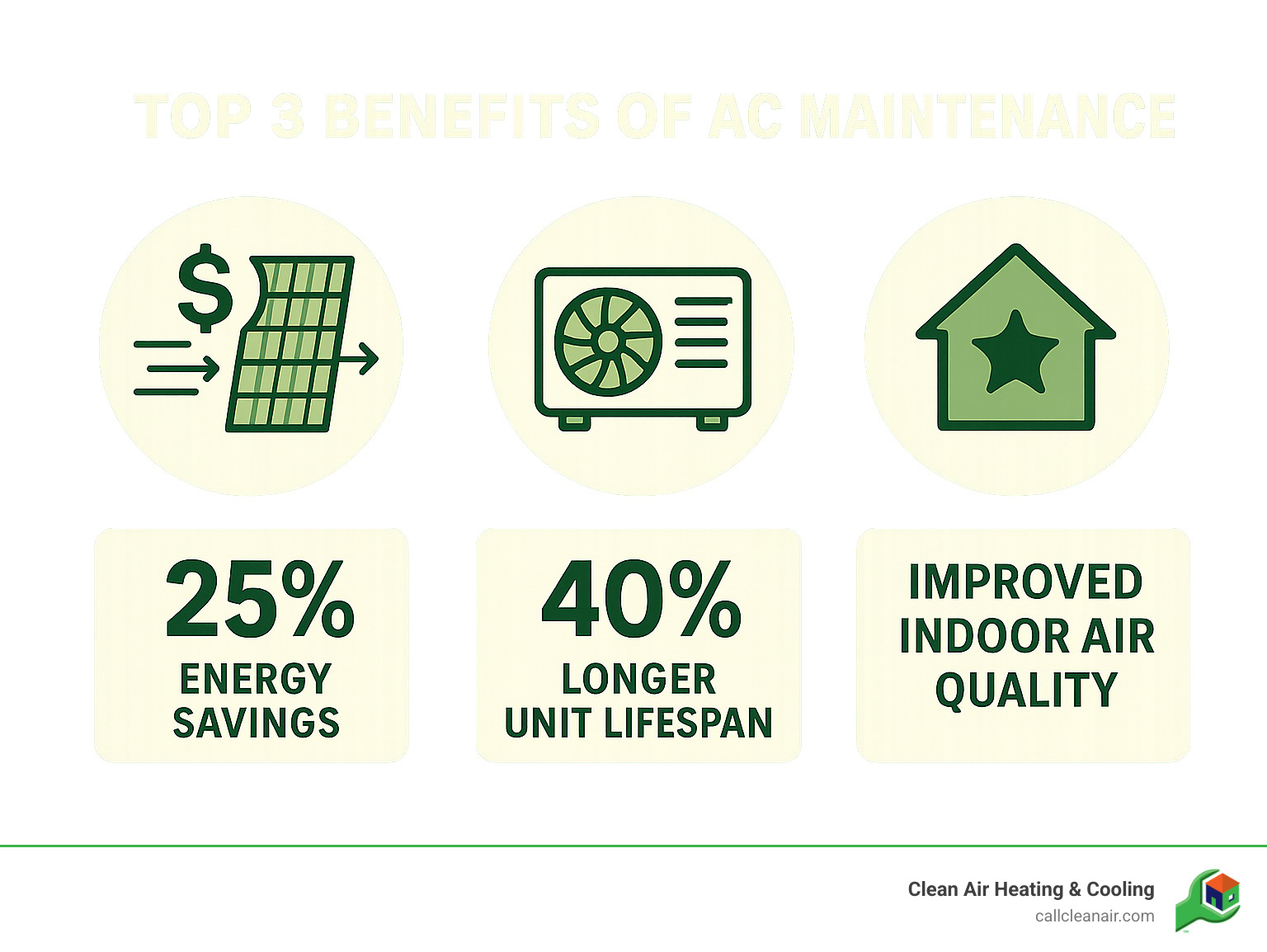
Terms related to AC maintenance tips:
Essential DIY AC Maintenance Tips for Homeowners
Taking care of your air conditioner doesn’t have to be intimidating. Many homeowners can handle basic AC maintenance tips themselves, and honestly, there’s something satisfying about keeping your cooling system running smoothly with your own two hands.
Before we dive into the fun stuff, let’s talk safety – because nobody wants to become a cautionary tale. Always turn off the power to your AC unit before doing any maintenance work. This means flipping the breaker at your electrical panel and using the exterior shut-off switch near your outdoor unit. Trust me, electricity and water don’t play well together.
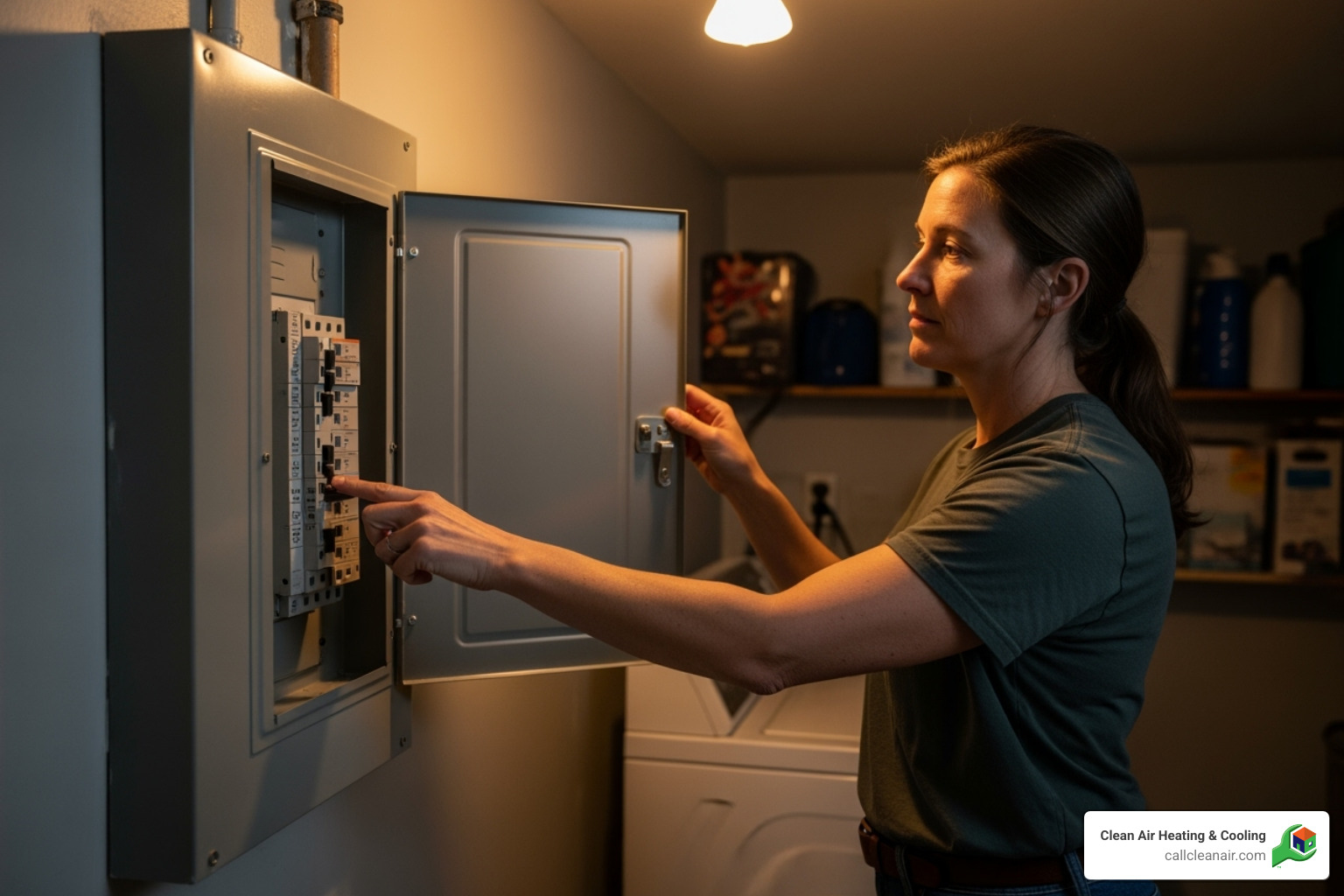
The good news? You probably already have most of the tools you’ll need sitting in your garage or utility closet. We’re talking basic stuff here – screwdrivers, a garden hose, maybe a wet/dry vacuum, and a soft brush. Nothing fancy required.
1. Change or Clean Your Air Filters
If I could only give you one piece of advice about AC maintenance tips, it would be this: change your filters regularly. Think of your air filter as your AC’s lungs – when it gets clogged with dust, pet hair, and who-knows-what-else, your entire system struggles to breathe.
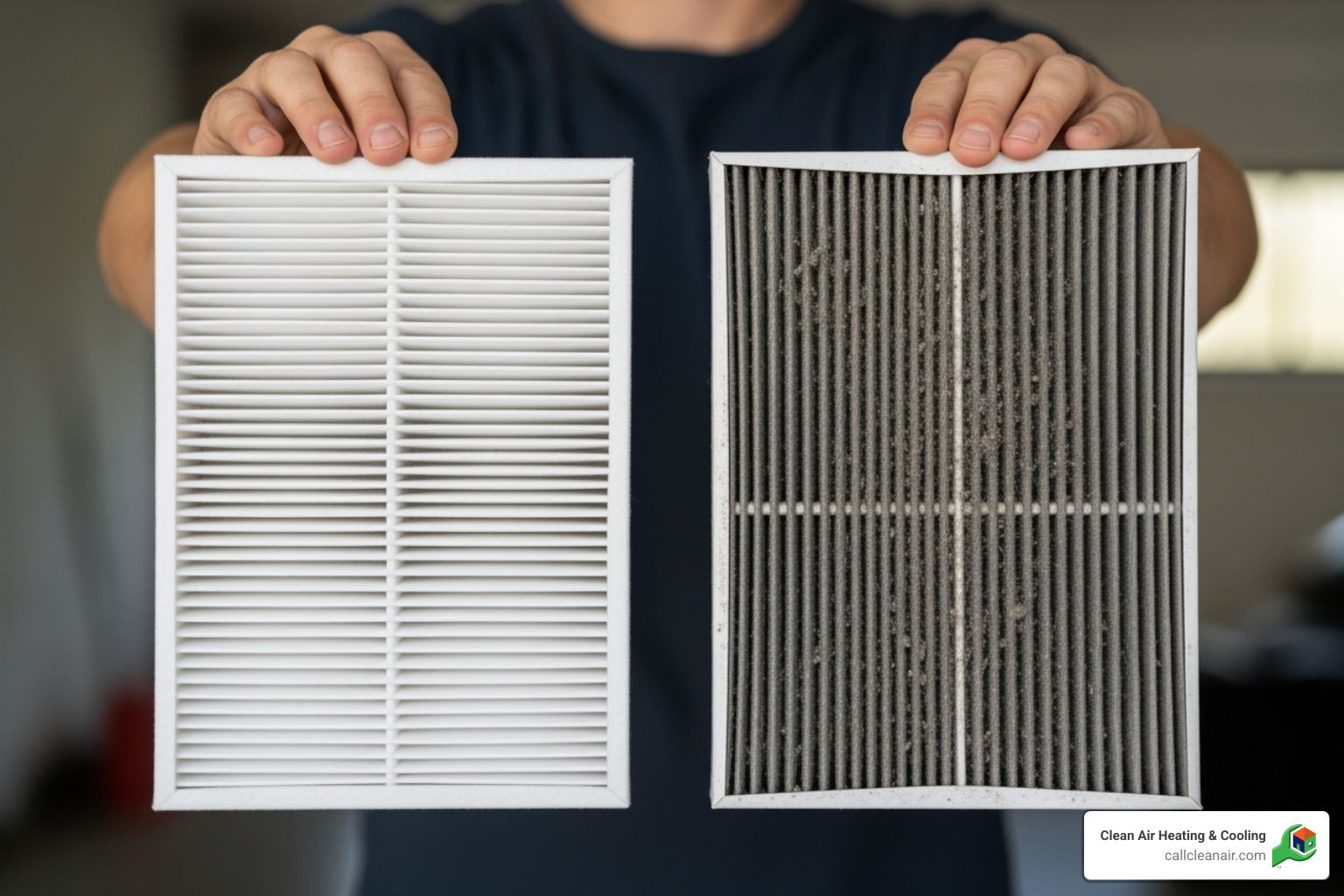
Here’s the thing that might shock you: a dirty filter can increase energy use by 15%. That’s like tossing money out the window every month just because you forgot to spend five minutes swapping out a filter.
Your filter lives in different spots depending on your system. For central air, check along the return duct near your indoor unit or behind those big return air grilles. Window units usually have the filter right behind the front grill.
How often should you change it? Well, that depends. If you have pets or allergies, you’ll want to check monthly during cooling season. Most homes can get away with changing filters every 2-3 months under normal conditions. But here’s a simple test – hold your filter up to the light. If you can’t see through it, it’s time for a change.
Washable filters are pretty neat because you can clean and reuse them. Just vacuum off the loose stuff first, then wash with mild soap and water. Some folks like using a mix of water and white vinegar. Whatever you do, make sure it’s completely dry before putting it back – nobody wants a moldy filter.
Disposable filters come with different MERV ratings, which basically tell you how good they are at catching particles. Higher numbers catch more stuff, but be careful – super high-efficiency filters can sometimes restrict airflow in older systems.
2. Clean the Outdoor Condenser Unit and Coils
Your outdoor unit works incredibly hard during our Pacific Northwest summers, and it shows. Leaves, grass clippings, cottonwood fluff (if you know, you know), and general outdoor grime love to collect around those condenser coils.
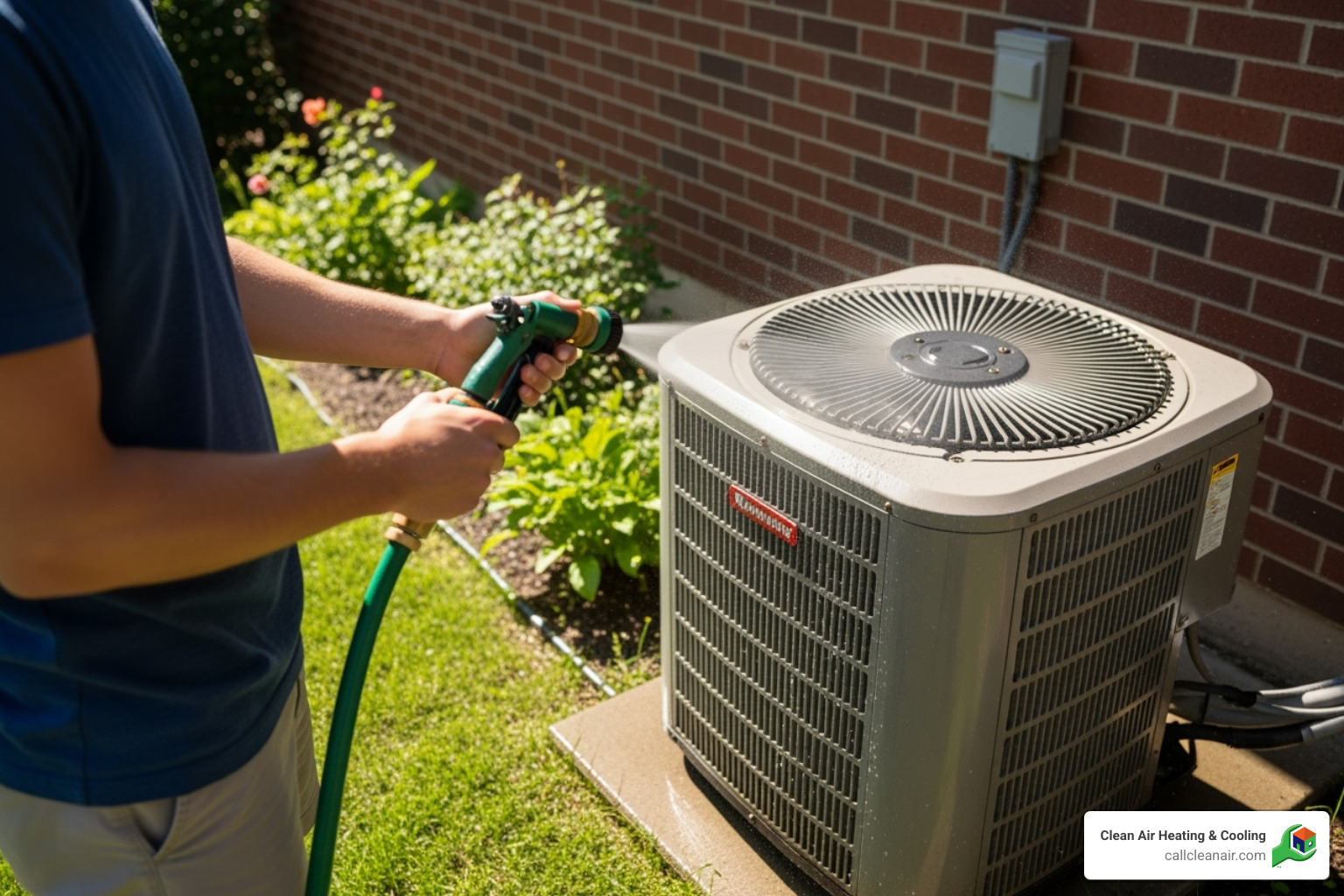
Start by removing any obvious debris – leaves, twigs, that random toy that somehow ended up there. You might need to remove the fan cage to get to the good stuff, but remember to shut off the power first.
Next, give your unit some breathing room. Clear at least 2 feet around the entire unit. This means trimming back those overgrown shrubs and cutting down any tall grass. Your AC needs airflow like we need coffee – it’s essential for proper function.
Now for the satisfying part – cleaning those condenser fins. These thin aluminum fins can get pretty gunked up. A strong spray from a garden hose will push debris from the inside of the condenser unit out. Spray from the inside toward the outside if you can access it. For really stubborn grime, commercial coil cleaner works wonders.
One important note: never use a pressure washer. Those delicate fins bend easier than your ego after a Seahawks loss. If you do notice bent fins, you can gently straighten them with a fin comb or even a butter knife – just be super careful not to damage the tubing inside.
3. Clear the Condensate Drain Line
Here’s something many homeowners don’t think about until it becomes a problem: that little drain line that carries away all the moisture your AC pulls from the air. When it gets clogged with algae and mold, things can get messy fast.
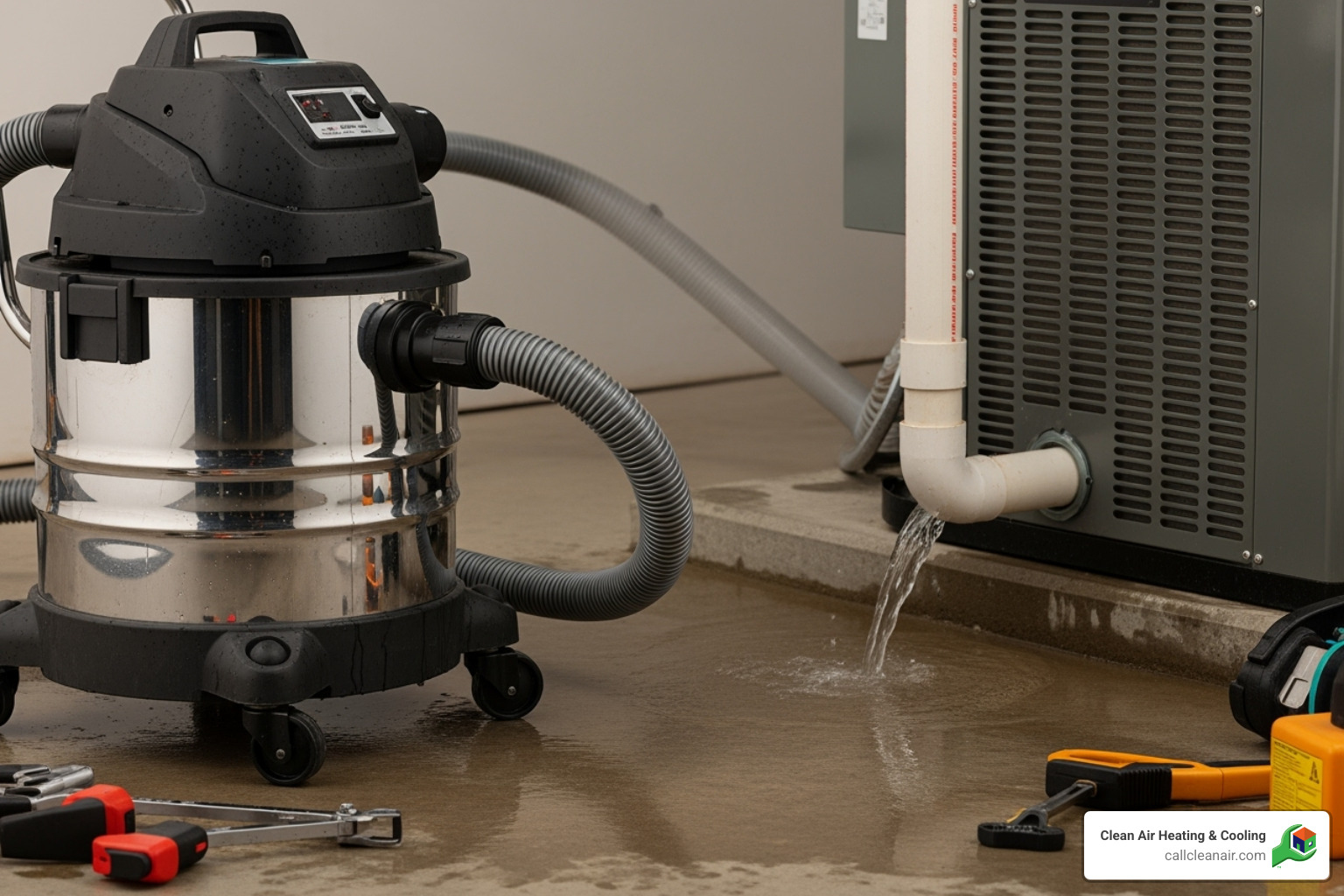
Find your drain line first – it’s usually a PVC pipe coming out of your indoor unit. If you see any sludgy buildup in the drain pan, clear it out with a stiff wire or small brush.
Here’s a neat trick: pour a cup of distilled white vinegar down the drain line and let it sit for about 30 minutes. This kills algae and mold naturally. Then flush it with water. Do this monthly during cooling season, and you’ll avoid most clog problems.
For stubborn clogs, break out the wet/dry vacuum. Attach it to the outside end of the drain line, seal it up with duct tape, and let it run for a few minutes. You’d be amazed what comes out sometimes.
A properly running air conditioner removes excess moisture, which keeps your home comfortable and prevents mold growth. Nobody wants a swamp house in the middle of summer.
4. Improve Efficiency Around Your Home
The best AC maintenance tips aren’t just about the equipment – they’re about making your whole home work better with your cooling system.
Smart thermostat settings can save you serious money. We recommend 78°F when you’re home and 85°F when you’re away. I know it sounds warm, but you’ll adjust faster than you think. Programmable and smart thermostats take the guesswork out of this, automatically adjusting throughout the day.
Sealing air leaks is like plugging holes in a bucket – it just makes sense. Check around windows and doors for gaps. Weatherstripping works great for moving parts like doors, while caulk handles the stationary stuff. Proper air sealing can cut cooling costs significantly.
Ceiling fans are your friend – they create a wind chill effect that makes you feel up to 4 degrees cooler. This means you can set your thermostat higher without sacrificing comfort. Just remember to turn them off when you leave the room.
Finally, close those blinds and curtains during the hottest part of the day, especially on south and west-facing windows. Sunlight streaming through glass can bump up your indoor temperature by 10-15 degrees. It’s amazing how much this simple step helps your AC out.
When to Call a Professional: Signs Your AC Needs an Expert
While you’re a superstar at those DIY AC maintenance tips, there are some jobs that are definitely best left to the pros. Think of your AC system like a highly tuned machine – it’s got complex electrical parts, special refrigerants, and components that require a keen, trained eye. Trying to tackle these without the right tools or know-how isn’t just risky for your unit; it can be downright dangerous for you! That’s why knowing when to call in a certified HVAC technician is just as important as knowing how to clean your filters.
Ignoring those little warning signs from your AC can be a costly mistake. What starts as a small hiccup can quickly turn into a major breakdown, leaving you sweating when you least expect it. At Clean Air Heating & Cooling, we believe in catching those issues early, so you can enjoy consistent comfort without the unexpected headaches.
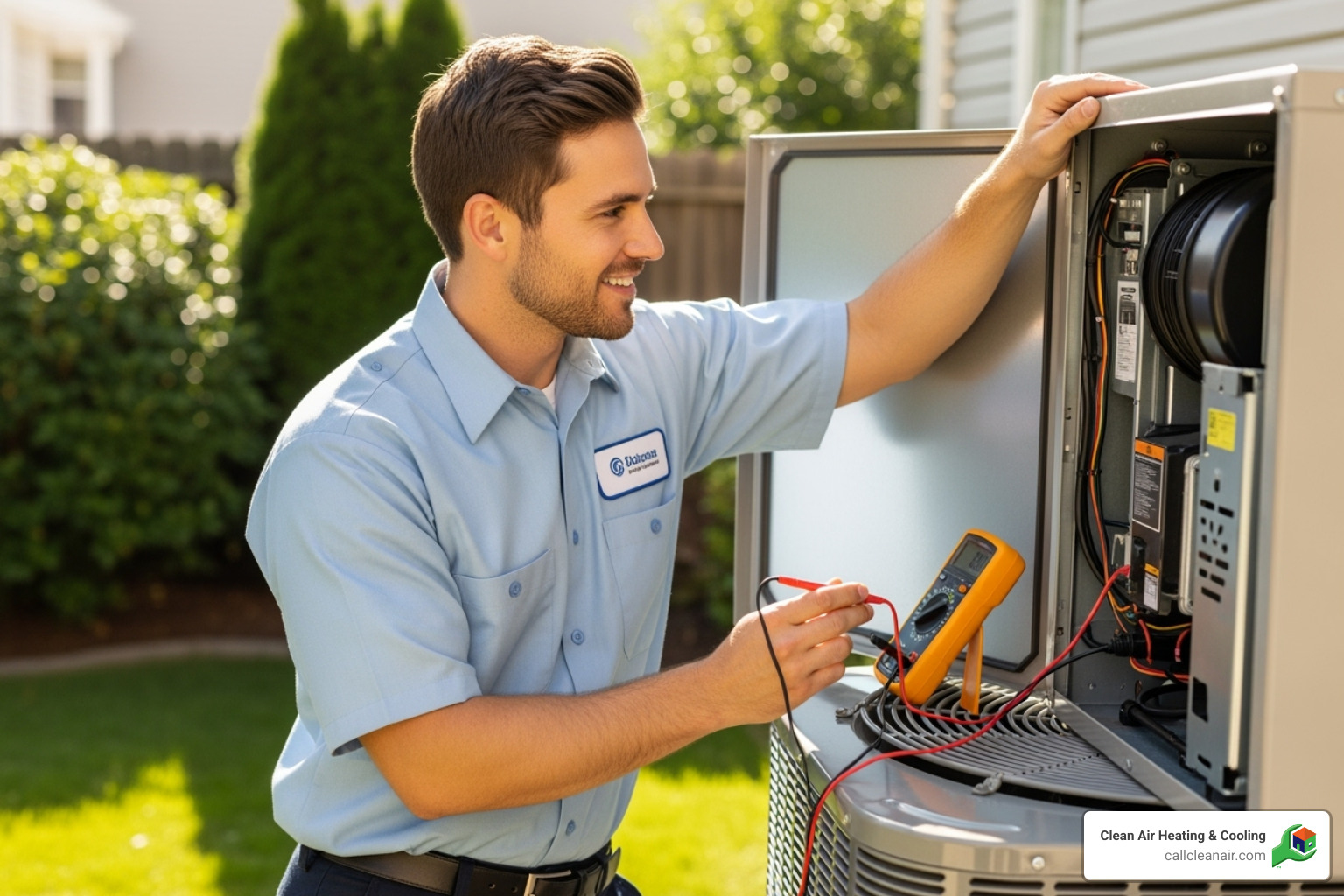
Signs Your AC Needs Professional Help
Keep your senses sharp for these clues that your AC is ready for an expert touch. Think of it as your AC whispering (or sometimes shouting!) for help:
First up, pay attention to the air coming out of your vents. If you’re noticing weak airflow, it could be something simple like a clogged filter (which you know how to fix!), but it might also point to bigger issues like leaky ductwork, a struggling blower motor, or a very dirty indoor coil. Even more concerning is blowing warm air. This is the clearest sign something’s amiss. After checking your thermostat and filter, if the air is still warm, it could mean your system is low on refrigerant (often due to a leak that needs professional repair), has a frozen coil, or there’s a problem with the compressor itself.
Your AC should also run smoothly. If it’s turning on and off constantly, known as frequent cycling on and off (short cycling), it’s working too hard and wasting energy. This can be caused by a dirty filter, a faulty thermostat, or even an AC unit that’s too big for your home. Also, listen closely. Your AC should be a quiet worker, so if you hear unusual noises, it’s time for a check-up. A banging sound might mean loose parts; squealing often suggests a motor or belt issue; a hissing sound could point to a refrigerant leak (which requires immediate attention!); and grinding might signal worn motor bearings.
Don’t ignore wet spots! Water leaks or pooling around your indoor or outdoor unit usually means a clogged condensate drain line (something you might have tackled already!). But if the problem persists or is accompanied by other issues, it could be a more serious problem like a cracked drain pan or a frozen coil that needs expert thawing. And what about your nose? Strange odors can tell a story. A musty or mildew smell often indicates mold or mildew growth, perhaps from a clogged drain. A burning smell, however, could signal an electrical issue – if you smell burning, shut off your unit immediately and call a professional! Finally, if your energy bills are suddenly increasing without a change in usage, your AC is likely struggling, losing efficiency due to an underlying problem that needs professional diagnosis.
What a Professional AC Tune-Up Includes
When our Clean Air Heating & Cooling technicians perform an annual tune-up, they go above and beyond what a homeowner can safely do. It’s like a full physical for your AC, ensuring every part is working efficiently. Did you know that regular seasonal inspections can extend equipment life by an impressive 40%?
Here’s a peek at the comprehensive services included in a typical professional AC tune-up:
Our technicians start by checking refrigerant levels to ensure your system has just the right amount of coolant and to carefully check for any leaks. They then move on to inspecting and cleaning coils, giving thorough attention to both the hard-to-reach indoor evaporator coil and the outdoor condenser coil for maximum heat transfer. Safety is paramount, so we’ll be testing electrical connections, tightening them, and measuring voltage and current to catch any signs of overheating. To keep things running smoothly, we’ll be lubricating motors and moving parts, which reduces friction and saves energy. We also inspect ductwork for leaks that might be costing you comfort and money, and calibrate your thermostat to ensure it’s reading accurately and helping you save energy. Finally, our team will verify all system controls for proper and safe operation, including the starting cycle, operating pressures, and temperatures, and even clean blower components for optimal airflow. We also make sure your condensate drain is completely clear to prevent any potential water damage or humidity issues in your home.
The Best Time and Cost for Professional AC Maintenance Tips
Timing is everything when it comes to getting the most out of your professional AC maintenance tips. The absolute sweet spot to schedule your annual tune-up is in early spring—think late February, March, or April. Why then? It helps you beat the rush! As soon as the summer heat kicks in, HVAC technicians get incredibly busy with emergency calls. Scheduling in spring ensures you get an appointment at your convenience, before you’re sweating it out. It also gets your system in tip-top shape, ready for the summer, preventing unexpected breakdowns when you need it most. Plus, any minor issues can be spotted and fixed before they become major, costly problems down the line.
As for the cost, while we can’t give specific numbers, a professional tune-up is a wise investment that typically takes between 1 to 2 hours. It’s a small price to pay for the peace of mind and the energy savings you’ll enjoy all season long. For a general idea on costs, you might find resources like the This Old House AC Tune-Up Cost Guide helpful.
The Big Payoff: Benefits of Regular AC Maintenance
When you follow these AC maintenance tips consistently, you’re not just keeping your system running—you’re making a smart investment that pays dividends all summer long. Think of it as putting money in the bank, except this bank account keeps your family comfortable while saving you cash.
Improved cooling performance is the most immediate benefit you’ll notice. A clean, well-maintained AC unit doesn’t struggle to reach your desired temperature. Instead of running constantly on those sweltering July afternoons, it cycles on and off efficiently, maintaining steady comfort throughout your home.
Your monthly utility bills will thank you too. Lower energy consumption happens naturally when your system runs efficiently. Clean filters allow proper airflow, clean coils transfer heat effectively, and all those moving parts work in harmony instead of fighting against dirt and debris. It’s like the difference between driving a well-tuned car versus one with dirty oil and clogged air filters.
Perhaps the biggest long-term benefit is extended equipment lifespan. Regular seasonal inspections can help your equipment last about 40% longer than neglected units. That means delaying the major expense of a full system replacement by several years. In Northwest Washington’s climate, where we rely heavily on our AC during those hot summer months, this extended lifespan represents thousands of dollars in savings.
Better indoor air quality might not be visible, but your family will feel the difference. Clean filters and coils mean fewer allergens, dust particles, and mold spores circulating through your home. This is especially important for family members with allergies or respiratory sensitivities.
Fewer costly breakdowns give you peace of mind when you need your AC most. Many major failures start as small, preventable issues that regular maintenance catches early. There’s nothing worse than having your system fail during a heat wave, when emergency repair calls are expensive and technicians are swamped.
Finally, a well-maintained system provides quieter operation. When everything is clean and properly lubricated, your AC hums along smoothly instead of rattling, grinding, or squealing. Your family can enjoy the cool comfort without the soundtrack of a struggling system.
Comparing DIY vs. Professional AC Maintenance
| Task | DIY Friendly? | Professional Required? | Frequency |
|---|---|---|---|
| Change/Clean Filter | Yes | No | 1-3 Months |
| Clean Outdoor Unit | Yes | No | Annually (Spring) |
| Clear Drain Line | Yes | No | Annually |
| Check Refrigerant | No | Yes | Annually |
| Inspect Electrical | No | Yes | Annually |
| Clean Evaporator Coil | No | Yes | Annually |
Frequently Asked Questions about AC Maintenance
After years of helping homeowners throughout Northwest Washington, we’ve noticed the same questions come up again and again. These are the AC maintenance tips questions that keep homeowners up at night (well, maybe not literally, but you get the idea!).
How often should I have my AC professionally serviced?
Here’s the golden rule: once a year, every year. Think of it like your annual doctor’s checkup – even if you feel fine, it’s smart to make sure everything’s working properly under the hood.
The sweet spot for scheduling? Early spring – we’re talking March or April, before the summer rush hits. This timing ensures your system is ready to tackle those scorching July days without breaking a sweat (unlike you, if your AC fails!). Your unit gets a clean bill of health right when you need it most, and you avoid that panicked call when everyone else’s AC decides to quit on the same 95-degree day.
If you’ve got an older system that’s been faithfully cooling your home for over a decade, or if you have furry family members who shed enough to knit a sweater, you might want to consider twice-yearly service. But for most homeowners, that annual spring tune-up is your ticket to reliable cooling all season long.
What happens if I don’t maintain my AC?
Oh boy, where do we start? Skipping AC maintenance is like ignoring that weird noise your car makes – it never ends well, and it always costs more in the long run.
First, your efficiency takes a nosedive. A neglected AC unit works harder than a one-legged cat in a sandbox, struggling to cool your home while guzzling electricity. Those higher energy bills start showing up faster than you can say “summer heat wave.”
Then there’s your indoor air quality. Dirty filters and grimy coils become breeding grounds for dust, allergens, and even mold. Suddenly, your AC isn’t just failing to cool your home – it’s actively making the air less healthy to breathe.
The real kicker? Those frequent, expensive repairs that could have been prevented with basic maintenance. Small problems snowball into major component failures, and before you know it, you’re facing a repair bill that makes your monthly mortgage payment look reasonable.
Worst of all, neglected systems have shorter lifespans and a nasty habit of sudden failure right when you need them most. There’s nothing quite like your AC giving up the ghost on the hottest day of the year to remind you why maintenance matters.
Can I use a pressure washer to clean my outdoor unit?
Stop right there! Put down that pressure washer and step away from the condenser unit. We know it’s tempting – all that built-up grime just begging for a high-pressure blast – but this is one of those times when more power definitely isn’t better.
Those delicate aluminum fins surrounding your outdoor coils are about as sturdy as tissue paper when faced with a pressure washer’s fury. High pressure bends and damages these fins, and once they’re mangled, they can’t do their job of transferring heat efficiently. It’s like trying to breathe through a pinched straw – your system will struggle and strain, leading to poor performance and higher energy costs.
Instead, grab your trusty garden hose with a gentle spray setting. Work from the inside out if you can access it safely (with the power off, of course!), and let the water do its work slowly and steadily. Your AC’s fins will thank you, and your system will keep running smoothly for years to come.
Stay Cool and Save Money with Expert Care
So, you’ve learned a lot about keeping your AC happy! Following these AC maintenance tips truly is the secret sauce for a comfortable home, happy energy bills, and an air conditioning system that lasts and lasts. Think of it as a partnership: you handle the simple DIY tasks that keep things humming daily, and we step in for the deeper, more technical care.
While changing filters and cleaning coils are huge steps you can take, some parts of your AC are best left to the experts. Those professional tune-ups aren’t just a cost; they’re a smart investment! They pay you back in lower utility bills, a longer-lasting unit, and the priceless peace of mind that your home will stay cool when the summer heat truly kicks in.
Here at Clean Air Heating & Cooling, we’re all about making that partnership easy and effective. We pride ourselves on prompt, high-quality service and truly putting our customers first. If you live in Whatcom, Skagit, Snohomish, Island, or San Juan County, our team of friendly, expert technicians is ready to make sure your AC system is performing at its very best.
Don’t let a surprise breakdown ruin your summer. Give your AC the little bit of love it deserves before the heatwave hits!
Schedule your professional HVAC service today and feel the Clean Air difference!

